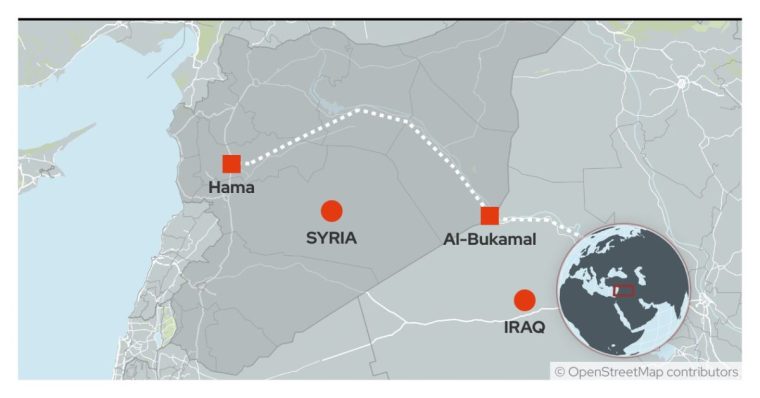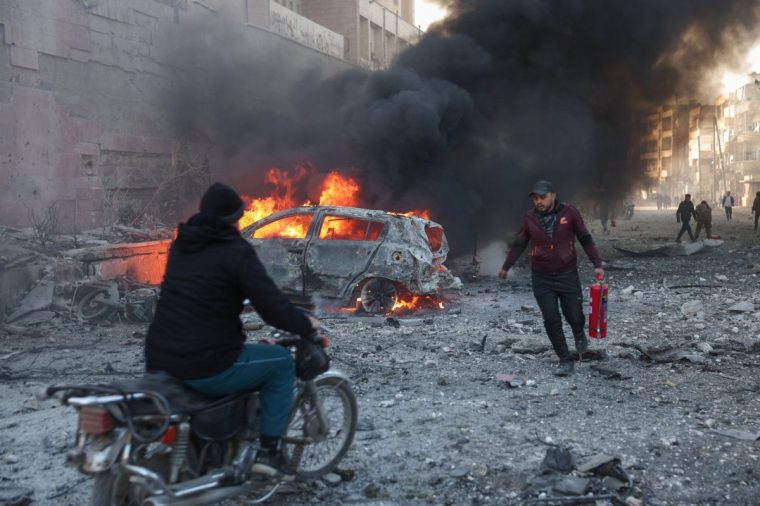Iranian-backed Iraqi militias crossed into Syria on Monday to provide reinforcements for the Assad regime as it struggled to contain a rebel offensive, according to the Syrian military and local media.
Hundreds of paramilitary fighters are being sent to strengthen positions in the northern provinces of Hama and Aleppo, military officials said, where rebels led by the Hayat Tahrir al-Sham (HTS) Islamist faction have made rapid gains – including the city of Aleppo – since launching the offensive last Wednesday.
“These are fresh reinforcements being sent to aid our comrades on the front lines in the north,” a senior Syrian military source told Reuters, adding that Iraqi fighters were entering via small groups to avoid attacks.

US air strikes hit militia positions near the border as they attempted to cross into Syria on Sunday night, Syrian media outlets reported.
The Iraqi reinforcements are said to include members of the Khataib Hezbollah organisation, which has claimed responsibility for attacks on US bases across the Middle East, including a drone strike that killed three US soldiers in Jordan in January.
The HTS-led rebels claimed the capture of several more towns in Hama province on Monday, some corroborated by open-source investigators, after President Bashar al-Assad’s forces appeared to have stabilised defensive lines around the city of Hama.
The regime’s main allies – Russia, Iran, and Hezbollah – have been slow to respond to the rebel offensive, in part because they are embroiled in other conflicts, said Orwa Ajjoub, a researcher of the Syrian conflict and Islamist militias in Syria at Malmo University, Sweden.
But as the threat to the regime has escalated, allies have been forced into action, he said, noting a flurry of diplomacy with Iran’s Foreign Minister, Abbas Araqchi, visiting Damascus on Sunday.
Araqchi pledged support for Assad, alluding to the Iran-led “Axis of Resistance” across the region that includes Hamas, Hezbollah, and Iraqi paramilitaries. “Resistance groups will help and Iran will provide any support needed,” Araqchi said.
Ajjoub suggests that sending fighters from Iraq was borne of necessity, but cast doubt on their capabilities.
“I think when Iran realised how critical the situation was, particularly after losing Aleppo, there was a visit from the Iranian foreign minister to assure Assad they were willing to support him,” he said. “Hezbollah, for various reasons, could not really move from Lebanon to support the Syrian regime, and so the decision was to send these Iraqi militias.”
“I think the decision was to stop the losses of the Assad regime before the opposition takes Hama, because Hama is close to Homs, and Homs is close to (Syrian capital) Damascus.”
“The maximum (Iran-backed groups) could do is to stop the defeats around Hama but I dont think they can push the opposition out of Aleppo,” Ajjoub added, suggesting this would rely on a deal between Turkey, Iran, and Russia – powers that are heavily involved in the Syrian Civil War that has raged since 2011.
Iran is motivated by threats to its supply lines to Hezbollah in Lebanon that run through Syria, analysts believe, amid Russian reports of an imminent rebel attack on the town of Bukalam on the Iraqi-Syrian border that serves as a transit point for weapons.
Dr Hamidreza Azizi, an Iran foreign policy specialist at the German Institute for International and Security Affairs, wrote: “Together with Israel’s constant bombings of border crossings between Syria and Lebanon, the fall of Bukalam would effectively disconnect key areas of the ‘axis of resistance.’
“Expect serious involvement by Iraqi militias to prevent this scenario from happening.”
Ruslan Trad, a security researcher at the Atlantic Council’s Digital Forensic Research Lab, said it would be increasingly difficult for Iran to support the Assad regime under fire from the US coalition and Israel, which has carried out heavy bombing of Hezbollah and Iranian positions in Syria over several years.
“Iran will try anything to prop up Assad, but it seems the price has suddenly gone up a lot and Tehran will have to risk if it doesn’t want to face serious problems for its proxies and logistics in the area,” he said.
“Iraqi militias entered Syrian territory and were immediately attacked by the US coalition; some of the convoy did reach the outskirts of Damascus, but it is unclear exactly how many fighters. The other problem awaits them there – Israel.”

Russia has also pledged to support the regime against the insurgency but is believed to have reduced its military assets in Syria due to the demands of the war in Ukraine, according to studies of satellite images.
Russian war planes carried out joint attacks with the Syrian military on rebel-held Idlib in northwestern Syria on Monday, with at least four civilians killed in the strikes, according to the Syrian Observatory on Human Rights, a UK-based conflict monitoring group.
President Vladimir Putin held talks on Syria with Iranian counterpart, Masoud Pezeshkian, on Monday, with the Kremlin pledging “unconditional support” for the regime.
But Russia has not publicly committed any additional forces to the Syrian army to fight the insurgency.
The rebel offensive was planned for a year but delayed by wars in Gaza and Lebanon, according to Hadi al-Bahra, president of the National Coalition of Syrian Revolution and Opposition Forces, the internationally recognised opposition leader.
“A year ago they started really training and mobilising and taking it more seriously,” he told Reuters. “But the war on Gaza (and) then the war in Lebanon delayed it. They felt it wouldn’t look good having the war in Lebanon at the same time they were fighting in Syria.”
“So the moment there was a ceasefire in Lebanon, they found that opportunity…to start.”

